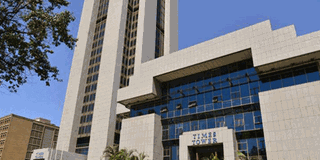Treasury bows to pressure extends consultations on new taxes

Times Tower, Kenya Revenue Authority headquarters in Nairobi. Kenya Revenue Authority (KRA) Commissioner General Githii Mburu said the deadline for submission of comments on the draft Excise Duty (Excisable Goods Management System) (Amendment) Regulations, 2023 had been extended to February 21, 2023.
What you need to know:
- The National Treasury extended the period for consultations on its proposed tax raises on various consumer goods amid resistance by manufacturers and business groups.
- Kenya Revenue Authority (KRA) Commissioner General Githii Mburu said the deadline for submission of comments on the draft Excise Duty (Excisable Goods Management System) (Amendment) Regulations, 2023 had been extended to February 21, 2023.
- The initial deadline had been set for February 7, 2023.
The National Treasury extended the period for consultations on its proposed tax raises on various consumer goods amid resistance by manufacturers and business groups.
Kenya Revenue Authority (KRA) Commissioner General Githii Mburu said the deadline for submission of comments on the draft Excise Duty (Excisable Goods Management System) (Amendment) Regulations, 2023 had been extended to February 21, 2023.
The initial deadline had been set for February 7, 2023.
“On behalf of the Cabinet Secretary, the National Treasury and Economic Planning, the Commissioner General hereby extends the deadline for submission of stakeholders' comments and input on the draft Excise Duty (Excisable Goods Management System) (Amendment) Regulations, 2023,” the KRA chief said yesterday.
“These will be considered in finalising the draft regulations” he added.
Sources told Nation that rising complaints and lobbying by business groups forced the National Treasury to extend consultations.
“There is a lot of concern about the state of the economy and whether introducing the taxes at this point would be detrimental. This informed the decision to have more views and consultations on how best to go about it” a government source said.
The Kenya Association of Manufacturers (KAM) and a lobby, the Alcoholic Beverages Association of Kenya (ABAK) have recently stepped up protests about the proposed taxes saying they will erode competitiveness and lead to job sheds.
The proposed taxes mean that the growing cosmetic industry clientele, alcohol, cigarettes, and fruit juice consumers face high prices as the government chases more revenues.
The National Treasury targets at least 14 categories of excisable goods in new tax proposals, with the four – consumed by millions of Kenyans daily – topping the list of products it is proposing to increase excise fees on by up to 316.7 per cent.
Targeted
In the Excise Duty (Excisable Goods Management System) (Amendment) Regulations, 2023, consumers of cosmetics and beauty products will now pay Sh2.5 for an excise stamp up from Sh0.6, cigarette and alcohol users Sh5 from Sh2.8 and fruit juices Sh2.2 from Sh0.6, Treasury proposes.
The cosmetics and beauty products consumers will be the most hit under the new proposals, with the proposed 316.7 per cent excise stamp fee increment.
The government has identified the cosmetics sector as a nascent source of revenue. The sector has recorded fast growth as millions of Kenyans grow interested in using cosmetic and beauty products, with official data showing that imports of essential oils and perfumes alone rose from Sh21.9 billion to Sh26.3 billion between 2017 and 2021.
Cigarette and alcohol users are set to be hit again with the 78.6 per cent proposed excise stamp fee increment following another increment in the Finance Act, 2022.
Alcoholic beverages such as wines and compounded spirits of alcoholic strength exceeding 6 per cent, will be charged Sh5 up from Sh2.8 also, while beers will be charged Sh3 per stamp, double the Sh1.5 they were charged.
In the Finance Act, of 2022, Treasury increased excise duty on beauty and cosmetic products by 15 per cent, fruit, and vegetable juices by 10 per cent, wine, and beer by 10 per cent, and 20 per cent on spirits.
And while traditionally excise taxes were meant to be applied on products harmful to human health such as alcohol and cigarettes, with the expected impact of deterring users from using them, KRA’s has evolved in recent years to include more product categories.
In the new proposals, KRA also listed fruit and vegetable juices among goods the government is looking to raise more revenues from, raising the excise stamp fee by 266.7 per cent to Sh2.2 per stamp.
This is also likely to have an impact on the prices of the products, with businesses seeking to recover costs by passing the same on to consumers.
Excise stamp fee on bottled water will, however, be retained at Sh0.5 per stamp, while other non-alcoholic beverages will be charged Sh2.2 per stamp, up from Sh0.6.





